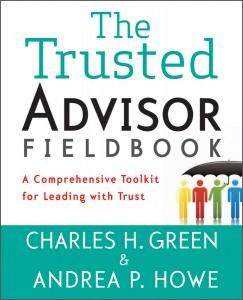 Trust between individuals is one of the most essential and important ingredients of personal influence. If motivation is the fuel of persuasion, trust is its lubricant. Trust lowers risk; it opens communication; it makes decisions more efficient and effective.
Trust between individuals is one of the most essential and important ingredients of personal influence. If motivation is the fuel of persuasion, trust is its lubricant. Trust lowers risk; it opens communication; it makes decisions more efficient and effective.
Of course, you don’t need a book to tell you that. The critical point is that trust is also within your control, and this excellent book by Charles H. Green and Andrea P. Howe shows you how to establish, accelerate, and maintain it.
Whether or not you are in sales, you exert influence and make a difference in others’ lives when they take your advice—but even if you are always right it’s no guarantee that people will take you advice. (And you don’t have to have teenage kids for this to be true.) As the authors tell us, you have to earn the right to be right.
The Trusted Advisor Fieldbook shows you how by opening up the black box and exposing how the process works so that you can become more trustworthy to others. It then goes into specific practical detail on how to apply the trust principles in everyday situations, from different aspects of the sales cycle to personal and organizational relationships.
Most “how-to” books such as this provide value on three levels:
- Things you already “know” you should do but need reminding or prompting to do more of
- Things you kind of know how to do, but get expert instruction on how to do it better
- Things you thought you knew, but were wrong
The fieldbook has a lot of material in the first category, but to me the most important reminder is worth quoting at length:
“The goal of traditional selling is to convince the buyer to buy from you—the goal of trust-based selling is to help the buyer do what is right for him. The difference is a question of focus and motives. Helping, as distinct from closing, is other-focused, nonmanipulative and trust-enhancing.”
I believe this quote could encapsulate the entire book, and because one of my pet causes is the professionalization of selling, I urge any salesperson reading this article to print this and post it somewhere that you can see it before any communication with a client or prospect. Even if you’re not in sales, change the words slightly and they will apply equally to you.
In the second category, there are a number of specific situations, including presenting, selling to the C-Suite, and negotiating, where they give useful advice and excellent insights. Most importantly, the examples of the phrases they provide to illustrate their points ring true, and demonstrate that the authors have very deep experience in these areas.
As to the third category, I pride myself on being right, and this is awkward to admit, but I may have to reconsider my traditional advice to keep price out of the discussion until the end. The authors make a convincing case that this just adds to the tension and angers the potential buyer; it’s best to let the buyer control when the topic comes out in the discussion.
Finally, I like the format of the book. In the form of a fieldbook, it provides numerous questions, forms and suggestions to think further about how to apply their ideas to your own particular situation. The “list of lists” at the end is also helpful; I found it easier to read them before beginning a new chapter.
I trust you will get a lot of value out of this book.





